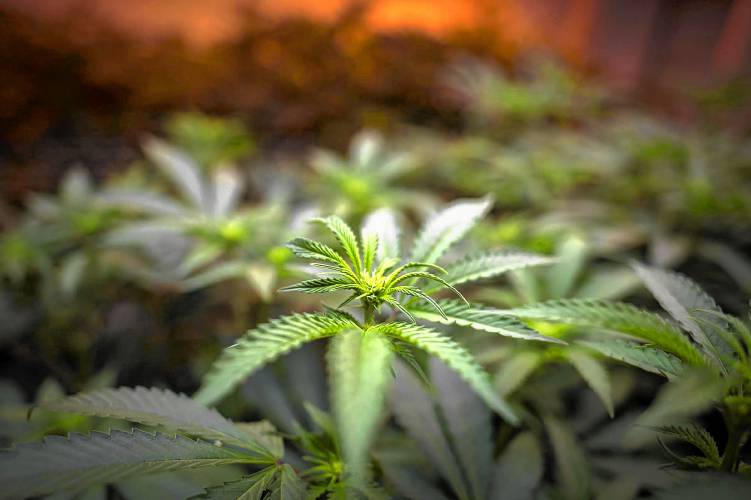Vermont House contemplates nixing THC caps for retail cannabis

Immature cannabis plants are seen in one of Devon Deyhle’s Tall Truck cannabis grow rooms in Peacham, Vt., on Monday, March 27, 2023. (VtDigger - Glenn Russell) —
| Published: 01-18-2024 8:40 AM |
The Vermont Cannabis Control Board is asking lawmakers to eliminate caps on the potency of certain marijuana products from state law — a move officials said could keep more users in the legal market but that faces opposition from some medical leaders.
The request is one of several proposed changes to the state’s marijuana policies included in H.612, which the House Government Operations Committee took up for the first time on Friday.
The bill also takes aim at what James Pepper, the control board chair, characterized as a growing industry of products derived from hemp plants that boast intoxicating effects from synthetic cannabinoids such as delta-8 or delta-9 tetrahydrocannabinol, or THC.
The bill would codify rules the board adopted last year limiting the sale of some potent hemp-derived products in the state and regulate them as cannabis products if they contain more than 0.3% THC, one of the psychoactive ingredients in cannabis.
Currently, state law caps the amount of THC in smokable cannabis flower products at 30% and the amount of THC in solid or liquid concentrated cannabis at 60%. The legislation under consideration — which is essentially a laundry list of the commission’s requests — removes those caps.
Pepper told lawmakers that as more adults use legal cannabis products, more could also develop a high tolerance, leading them to seek out more potent options. If the legal market can’t provide those options, they may decide to buy from an unregulated seller.
Dave Silberman, co-owner of FLORA Cannabis in Middlebury, said in later testimony that he and other store owners share this concern. He also said the existence of potency caps on concentrated cannabis products, specifically, forces manufacturers to use potentially harmful fillers.
“By limiting potency to 60%, you’re creating a perverse effect of giving the black market a monopoly on a product,” Silberman said. “It’s a niche product — it’s maybe 4% or 5% of the entire market — but you’re giving them a monopoly on it.”
Article continues after...
Yesterday's Most Read Articles
 Kenyon: Dartmouth shows it has no patience for peaceful protest
Kenyon: Dartmouth shows it has no patience for peaceful protest
 Claremont movie theater to close at end of May
Claremont movie theater to close at end of May
 Lebanon High senior comes to the aid of driver with health problem
Lebanon High senior comes to the aid of driver with health problem
 Editorial: Response to campus protests only adds fuel to the fire
Editorial: Response to campus protests only adds fuel to the fire
 Norwich author and educator sees schools as a reflection of communities
Norwich author and educator sees schools as a reflection of communities
 Dartmouth moves swiftly to stymie demonstration, leads to 90 arrests
Dartmouth moves swiftly to stymie demonstration, leads to 90 arrests
But several other people who testified before the committee and work in the medical and counseling fields pushed back on the bill, arguing that there are public health risks to selling more potent substances in retail stores and marketing them publicly.
Jill Sudhoff-Guerin, a lobbyist for the Vermont Medical Society, was among them. She said her organization doesn’t support H.612 as written but could get behind a change allowing people with certain medical conditions to access higher-potency products.
Friday’s hearing was hardly the first time in recent years that lawmakers have debated whether potency limits are beneficial to Vermont’s market. Vermont is one of two states — of the two dozen nationwide where recreational marijuana is legal — that cap the potency of cannabis concentrates.
H.612 also includes measures that could give a boost to Vermont’s medicinal cannabis program, according to Pepper. He shared data from the control board showing that the number of patients in the program is at its lowest level — under 3,000 — since 2015.
But that’s not entirely surprising, Pepper and several other lawmakers noted, given the advent of retail cannabis sales in the state, which went live in October 2022 and are exceeding the control board’s expectations for revenue, Pepper said on Friday.
The bill would require a cannabis retailer to pay the taxes on products sold to a patient, or the caregiver of a patient, who is registered with the state’s medical program. As it is, state law allows medical users to buy tax-free from a dedicated medical dispensary — but the board wants that benefit to apply wherever those users get their products.
Cannabis retailers oppose this change, Silberman told lawmakers.
The bill would also reduce the operating fees the state charges medical dispensaries, including reducing an application fee from $2,500 to $1,000 and cutting an annual renewal fee from $25,000 down to $5,000, according to the text of the legislation.
It would also increase the lifespan of a medical marijuana card from three years to five years for people who use cannabis for a chronic condition other than pain, which Pepper said is designed to reduce the frequency with which patients have to fill out new paperwork, especially when they have conditions that are lifelong.
Another measure in the bill would add ulcerative colitis — a chronic inflammatory bowel disease — to the list of conditions that qualify a person to get access to medical cannabis.
The Vermont Medical Society, which represents thousands of doctors in the state, also opposes both of these changes as written in the bill, Sudhoff-Guerin told lawmakers.
The government operations panel expects to take more testimony on the bill later this month.

 David Zuckerman is seeking reelection to lieutenant governor’s office
David Zuckerman is seeking reelection to lieutenant governor’s office Killington is the East’s largest ski resort. A developer wants to expand on that in a big way.
Killington is the East’s largest ski resort. A developer wants to expand on that in a big way.
